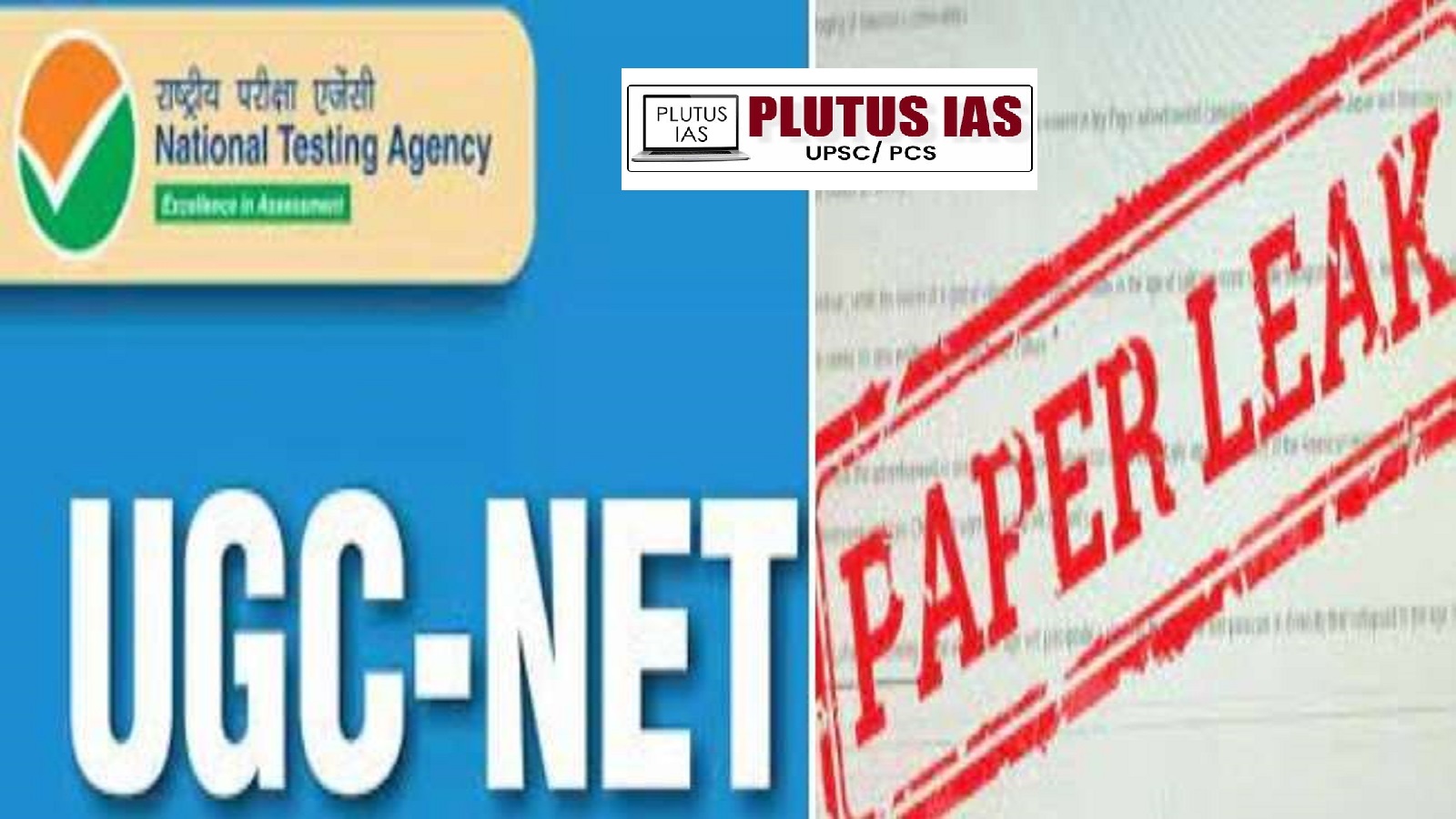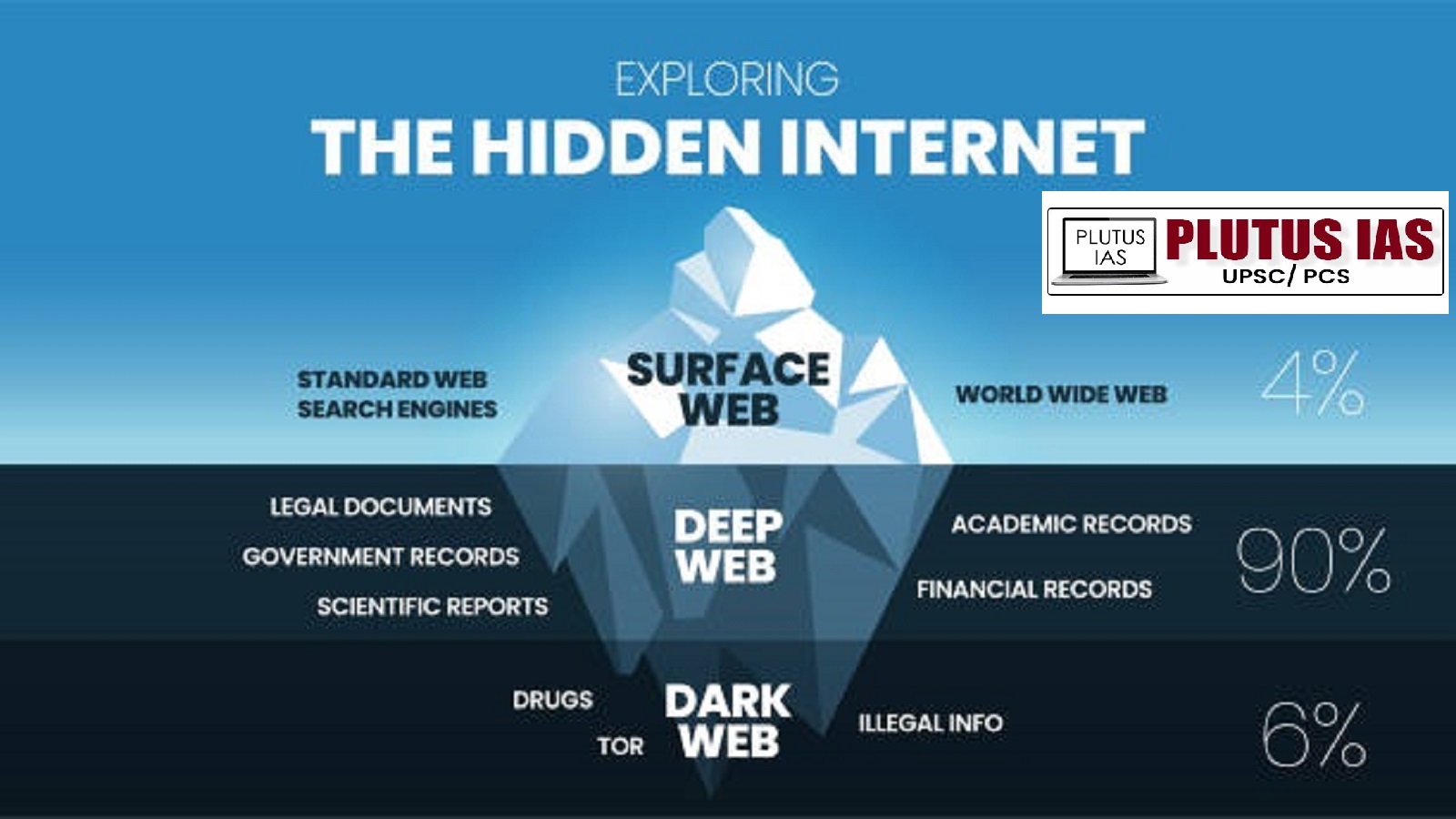16 Jul Dark Net vs. Data Protection Laws and Right to Privacy in India
( This article is related to the section ‘ Cyber Security, Information Technology and Computers, Cyber Warfare, Transboundary Nature of Dark Web ’ of UPSC Civil Services Mains Exam General Studies Paper- 3 and ‘ Dark Web , Potential Threats of Dark Net , Child Pornography , Right to Privacy , Digital India ’ of UPSC Preliminary Exam. It also includes suggestions from the PLUTUS IAS Team. This article is related to the section ‘ DarkNet Vs Data Protection Laws in India & Right to Privacy ’ of ‘ Daily Current Affairs ’ .)
Why in the News ?

- Recently, the papers of National Eligibility Entrance Test (NEET-UG) and University Grants Commission-National Eligibility Test (UGC-NET) were leaked on the dark web even before the exams.
- This incident has led to protests against the current government at the national level in various states and many serious problems.
Dark Net :
- The Dark Net is a hidden part of the Internet that is inaccessible or invisible to regular search engines.
- Initially it was originally developed with the aim of facilitating secure and confidential communications for government and military use only.
- In recent times it has also become associated with criminal activities such as the sale of illegal weapons and drugs.
- Communication on the dark net is encrypted, leaving no trace of the communication between the sender and the recipient. Hence, the confidentiality and privacy of the users is ensured to the highest level.
Is accessing the dark web legal in India?
- Accessing the dark web is legal in India.
- The Government of India does not consider it as an illegal activity.
- However, this does not mean that anyone can do whatever they want.
- Activities like child pornography, buying guns, pistols, rifles, drugs, etc. are considered illegal. Therefore, the dark web itself is not illegal, but a person’s activity or intent is taken into account when using it.
- The use or access of the dark web is not punishable under Indian law, as its use is legal in India.
- Using it for illegal purposes is punishable under Indian law.
Regulatory Challenges in Regulating Dark Web in India :

Following are the major challenges in regulating the dark web in India –
- Encryption technology and anonymity : The biggest challenge of the dark web lies in its strong encryption technologies and the anonymity of users.
- Transactions in Cryptocurrency : Most financial transactions on the dark web are conducted in cryptocurrencies, which provide additional anonymity and make transactions harder to trace.
- Transboundary Nature : The cross-border nature of the dark web further complicates matters, as it involves users from different countries, necessitating international cooperation.
- Ensuring freedom of information and the right to privacy online : It is a big challenge to end the illegal activities flourishing on the Dark Web and at the same time ensure freedom of information and the right to online privacy.
Potential dangers of the dark net :
- Misuse of Identity : Log-in details and other personal information are harvested on the darknet, which is misused to create fake identities, financial fraud and other crimes. Additionally, there may be data available on the darknet that may be of use in other practices.
- Malware and Ransomware : Another threat of the dark net is malware and ransomware. Most malware is transmitted on the darknet and then used on publicly accessible websites, so being on the darknet can put you at risk of being exposed to malware or ransomware that could harm a business or steal someone’s identity. Could.
- Drug smuggling : The darknet is a major haven for drug dealers, who fearlessly sell drugs on the darknet. Information on the distribution of drugs and other illegal materials may also be available on the darknet.
- Terrorism : The darknet can be a space for terrorists to share information, recruit terrorists, and plan terrorist activities and other crimes. Terrorists also use the darknet for illegal purchases of explosives and weapons using Bitcoin and other crypto-currencies.
- Child pornography : The darknet has been used for trafficking, child pornography and other crimes. At least 337 people have been arrested in the US in an international investigation to track down users of dark web child pornography websites.
Need for Data Protection law in India :
- Increase in cyber crime : Due to increasing digitization and digital complexities in India, there is a need for data protection law. Leaking of public data is common in India, from downloading Aadhaar numbers from government websites to downloading voter lists in large quantities. There is an urgent need for a data protection law due to the recent increase in crimes like WhatsApp, Pegasus scam.
- Protection from data theft : India still lacks a comprehensive legal framework to protect data privacy. Unlike the data protection rules applicable in the EU and the US, India requires data protection laws to ensure that data stored and used by public and private entities is not misused.
- Right to Privacy : The Supreme Court (SC) in Justice KS Puttaswamy vs Union of India declared that the right to privacy is a fundamental right under Article 21 of the Indian Constitution, and must be protected through law. Thus, it is the main duty of the state to protect the privacy of the individual through law.
- Regulating companies : The use of personal data by the state and private companies should be done in a transparent and regular manner. To avoid unregulated and arbitrary use of data, it is extremely important to have a clear legal framework.
- Digital India : India is the country with the second largest internet user base in the world. Therefore, the government should pay special attention to ensure the security of citizens’ data. There are 450 million internet users in India. Therefore, with emphasis on Digital India, the government should ensure security of citizens’ data.
- Data security is very important in the digital age. The State must prevent and investigate digital crimes, prevent misuse of data and encourage data protection through legislation.
Solution / Way forward :
- Information Technology Act, 2000 : This Act passed by the Indian Parliament addresses many aspects of information technology such as providing legal recognition to electronic documents, giving legal recognition to digital signatures, studying the history of the justice system for cyber crimes and development of information technology. Is.
- Need to consider adopting the China Model : China’s new economic policies are intended to reduce the growing wealth gap between people. This is conducive to their economic growth, but critics say it could lead to greater control of business and society. India may also need to consider adopting the China model, in which firewalls and Tor traffic are blocked.
- Security of dark web : India should promote multilateral exchanges to address the challenges of the cross-border nature of the Dark Web. For this, new encrypting tools and other technical challenges will be helpful.
- VPN Registration : VPN registration means that individuals or organizations complete the registration process set by the government to use a VPN (Virtual Private Network). This is a security process in which the user’s identity and server connection to the VPN service provider is ensured. Through this process the government can control the use of VPN and ensure compliance with security related rules. Under this, India’s incredible firewall can deal a deep blow to the flourishing darknet crime.
Source – Times of India and PIB.
Download plutus ias current affairs eng med 16th July 2024
Practice Questions for Preliminary Exam :
Q.1. Consider the following statements regarding the Dark Web.
- The dark web is illegal in nature.
- The Dark Web cannot be accessed through your normal browsers and can only be accessed with a special, anonymous browser, such as Tor or the Invisible Internet Project (I2P).
Which of the above statement/statements is true?
A. Only 1
B. Only 2
C. 1 and 2 Both statements.
D. Neither of the above.
Answer – A
Practice Questions for Main Exam :
Q.1. Discuss what are the major challenges in regulating the dark web in India and how they can be solved? (UPSC – 2019 Word Limit – 250 Marks – 15 )




No Comments